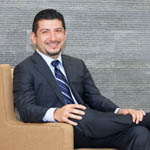By joining Uber Operations LLC, Eduardo Gonzalez Loumiet was taking a risk—but it was one of the best decisions he’s ever made. Newly married, with a good job in the Caribbean, the IT and finance expert was approached by Uber Operations in 2008 to help grow and manage its health-information-exchange business. After six years of managing multimillion-dollar projects in the financial industry, Gonzalez Loumiet had to start from scratch, but today he happily leads the business as managing director and as senior project manager from Uber Operations’ Tallahassee, Florida, office.
 To more than triple our revenue by the end of 2012, we implemented three strategies. We diversified into the private sector, so we now have more and more clients that are private hospitals, private universities, and private health-care systems. We streamlined our operations by using virtual-office technology and collaborative tools. And I’ve helped to brand and market our product, überXchange—a low-cost, health-information-exchange appliance that facilitates secure health-information exchange in public and private health-care settings.
To more than triple our revenue by the end of 2012, we implemented three strategies. We diversified into the private sector, so we now have more and more clients that are private hospitals, private universities, and private health-care systems. We streamlined our operations by using virtual-office technology and collaborative tools. And I’ve helped to brand and market our product, überXchange—a low-cost, health-information-exchange appliance that facilitates secure health-information exchange in public and private health-care settings.
I also had to come up with a strategy to become knowledgeable in health technology. Uber Operations had hired me to grow its brand and to increase its revenue—and I felt it was important for me to have health IT experience under my belt, so I began to get involved in the company’s projects for major clients, including the Association of Public Health Laboratories (APHL), the Centers for Disease Control and Prevention (CDC), and the public-health departments of Florida and Texas. These projects really opened my eyes to the importance of the industry and the technology that’s out there, which facilitate saving lives nationwide. So, while I manage the company’s operations, I also wear the hat of senior project manager, and that’s given me the experience I needed. Now when I hire new people or pitch our services to a hospital, I can say I’ve done the work.
There aren’t enough health IT people out there, especially when it comes to Latinos and other minorities. At many IT events, I am often one of few Latinos in attendance. I try to entice Latinos, and explain that health technology is one of the hottest industries in the world and it is seeing rapid innovation and hiring. It’s still developing, so there isn’t much competition, and now is a good time to get involved.
We spend a lot of time and money on our training and recruiting program. The average experience of our consultants is 10 to 12 years. At the end of the day, we could potentially save lives, and I’m not a big fan of deploying folks with minimal experience. Right now, we have 25 team members, but the goal is to grow to 30-35 over the next year and a half. I don’t like to say “no” to work, but I also don’t want to sacrifice quality. Our new offices and innovative training room is a testament to our commitment to preparing our team.
There is definitely potential for expansion abroad. Certainly, there are myriad opportunities for clients in the United States alone, including pockets of rural areas that have no health-information exchange. But from my past experience in doing business abroad, I know there are opportunities in the Caribbean and in Latin America. Our five-year plan takes into consideration a potential expansion into our neighbors to the south.
I’m a lucky man, and now it’s my turn to give back. Due to the political environment in Cuba, my family left in 1960 and worked very hard to provide opportunities, education, and guidance for me and my sisters. Now, I have the best of both worlds—I manage a growing company and am in a position to help people save lives.![]()


